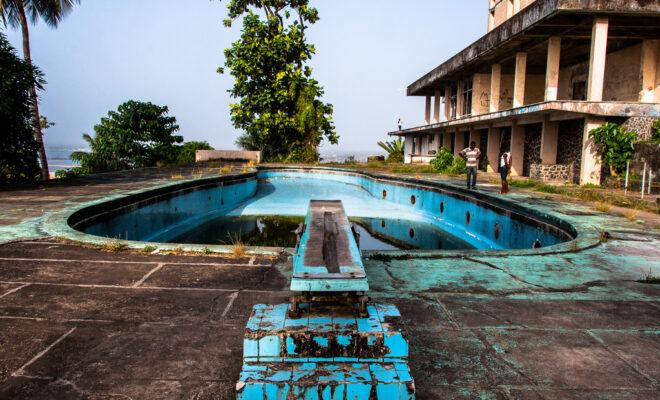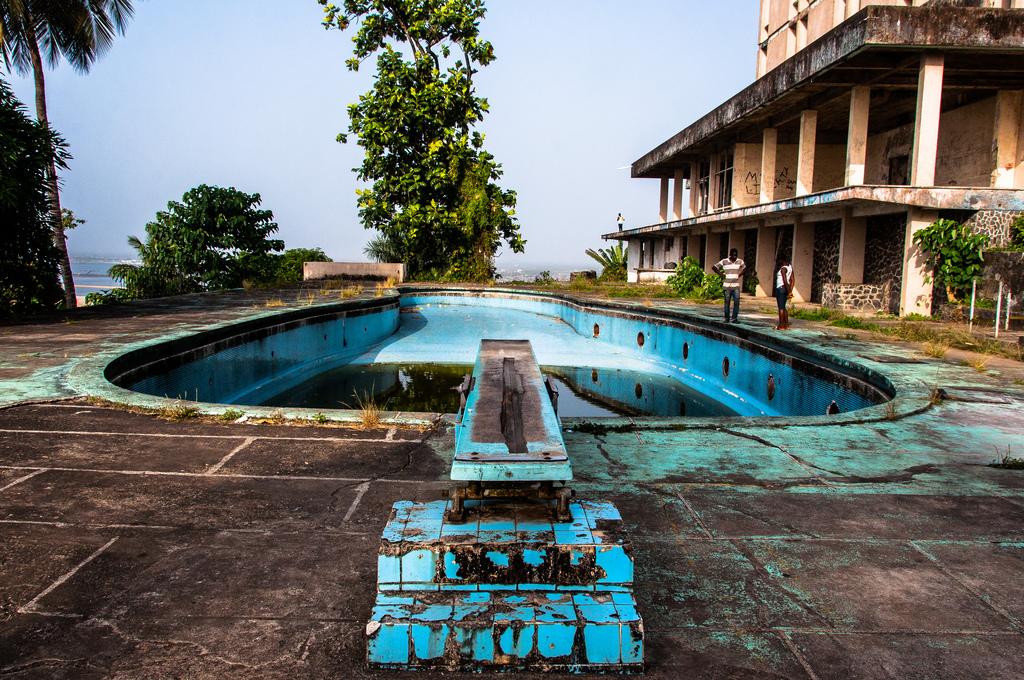“You have to face justice so I can get peace”: Calls for war court in Liberia

15 years after the brutal war ended, no one has been prosecuted in Liberia and many victims feel they’ve been forgotten.

Hundreds of thousands of people were killed in Liberia’s consecutive civil wars. Credit: Mark Fischer.
In July 1990, Victoria Duo sheltered along with two thousand others, her toddler strapped to her back, in St Peter’s Lutheran Church in Monrovia.
“In the night, we started hearing gun sounds,” she recalls. “There was nowhere for us to go. The soldiers started collecting money then fired on us.”
She only narrowly survived what is now renowned for being the worst single atrocity in Liberia’s consecutive civil wars. Troops loyal to then president Samuel Doe killed around six hundred people that day. Duo was shot in the arm and neck, causing her to fall, before the soldiers switched their aim to bodies on the ground. Her young child sustained wounds that led to the amputation of his left leg, but he survived. Her husband was not so lucky.
Liberia’s 14-year period of civil war began in December 1989 when rebel commander Charles Taylor led fighters over the border from Côte d’Ivoire. His aim was to take power, but it was a harder task than anticipated. The ensuing protracted conflict led to around 250,000 deaths and involved multiple atrocities including widespread sexual violence and the conscription of children as soldiers.
A series of ceasefire attempts eventually led to elections in 1997 in which Taylor was elected president. The peace did not last long, however, with violence flaring up again in 1999. This war culminated in a fierce battle around Monrovia in 2003 which led Taylor to resign and leave the country.
Following more elections, Ellen Johnson Sirleaf became the country’s new president in November 2005. One of her government’s first actions was to establish a Truth and Reconciliation Commission (TRC). It published a report which called for prosecutions and reparations.
Yet nearly 15 years later, not one person has been held accountable on Liberian soil for committing crimes during all those years of deadly violence.
Government reluctance
When George Weah became president in January 2018, many hoped the TRC’s recommendations might finally be enacted. Unlike his predecessor Sirleaf, against whom the TRC report had recommended sanctions due to her support of rebel factions during the war, Weah had no personal involvement in the fighting; his career as an international football star spanned the whole period. Moreover, as a UNICEF Goodwill Ambassador in 2004, he had insisted that justice must be brought on those who armed children.
Since he came to office, however, those hopes have been fading. The government has made it clear that its priority is infrastructure development and Weah’s stance on a war crimes court has become increasingly ambiguous. In November 2018, shortly after thousands took to the streets in Monrovia to call for a court, for example, Weah made a statement implying that Liberia might have to choose between justice and peace.
This perspective has some support in Liberia. Some people question whether security forces would be capable of quelling any unrest caused by the re-opening of old wounds. Others, such as 28-year-old Monrovia resident Philip Boe, even go as far as to suggest that those calling for a court are deliberately trying to destabilise Weah’s leadership. “All they want to do is see the country crumble,” he says.
These concerns aside, however, there may also be political reasons for the president’s reticence. In the second round of the presidential elections, for instance, Weah received the important backing of Prince Johnson, a wartime rebel commander whom the TRC accused of committing “the highest number of violations ever recorded for individual perpetrators”. Now a senator, he has threatened to mobilise his sizeable support base in Nimba County if prosecuted. Furthermore, Weah’s vice president, Jewel Howard-Taylor is the ex-wife of Charles Taylor, although she was cleared by the TRC.
Edward Mulbah, Executive Director of the Liberia Peacebuilding Office, suggests: “Those who enjoy state power are not keen about evaluating their role in the war”.
“My life can’t be where it’s supposed to be”
While there may be legitimate concerns that prosecutions could unsettle what Weah recently described as a “fragile peace”, campaigners argue that a court is essential to address the root causes of the conflict in order to establish long-term stability. The TRC identified these causes to include: “poverty, greed, corruption, limited access to education, economic, social, civil and political inequalities; identity conflict, land tenure and distribution”. There is a widespread feeling that these problems have yet to be addressed.
Advocates of justice also argue that accountability is necessary where there are victims. They point out that many who suffered from Liberia’s civil war are living in poverty today and have received neither symbolic nor material reparations.
Victoria Duo, for example, ekes out a living selling plantain at Monrovia’s Gorbachop market. Her son Richard, now 31, is disabled and unemployed.
Richard knows some people who committed atrocities in the war. He has represented Liberia playing amputee football and played alongside ex-combatant teammates who admitted their crimes. “It was difficult for me to accept, but as time went by I had to let go of certain things,” he says. “Working together with those guys on the football field was incredible. We promoted peace through our soccer.”
Yet in spite of this experience, Richard insists on the need for a war crimes court. “Today my life can’t be where it’s supposed to be,” he says. “I’m not properly educated and I can’t play amputee football all my life. I don’t care whether you are my teammate or whatever; if you have to face justice so I can get peace and benefits that would be good.”
“Since that thing happened in 1990, we never received even five dollars’ benefit,” agrees Duo. “All I want is to go to hospital to free the pain in my body.”
What next?
Since Weah took office, calls have grown for a court to be established. Civil society groups have led calls domestically, while the UN Human Rights Committee in July 2018 expressed concern over continuing impunity in Liberia and called for the justice and reparations in keeping with the TRC’s recommendations.
Broader public opinion in Liberia appears mixed. In a recent national survey, a third of respondents were in favour of retributive justice, though Mulbah from the Peacebuilding Office believes further analysis is necessary to fully understand public feeling about a court.
Jefferson Koijee, the head of the ruling party’s youth league and now Monrovia’s city mayor, has called for a referendum to gauge wider opinion. But some such as activist Adama Dempster disagree with this approach. “There’s no referendum for criminal accountability,” he says. “When the warlords and rebels killed people, did they go for referendum?”
“All we need is the political will of the government,” echoes Elise Keppler, Associate Director at Human Rights Watch.
This does not appear to be forthcoming. And while international partners may be willing to urge the government, they are unlikely to be prepared to bankroll what would be a costly judicial process.
For the moment, that means that despite the hope when Weah became president those guilty of committing war crimes in Liberia remain unprosecuted, while their victims like Richard Duo continue to await justice or reparations.
“People who committed atrocities are enjoying the good life,” he says. “It’s not fair.”







The warlords have hijacked political process to delay justice for their victims. The international community must do more to address human rights violations against innocent civilians. In addition, United Nations did very little during the entire 20 years in Liberia to address human rights violations or provide services to victims. UN reluctance empower the warlords politically and economically leaving victims more vulnerable in Liberia. We are demanding Justice for war crimes in Liberia.